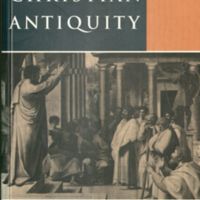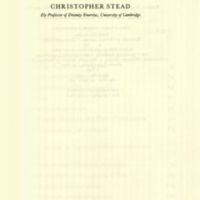Philosophy in Christian Antiquity
Dublin Core
Title
Philosophy in Christian Antiquity
Description
From the beginnings to Socrates -- Socrates and the platonic forms -- The philosophy of Plato's maturity -- Aristotle -- Epicurus and the Stoics -- The Middle Platonists and Philo of Alexandria -- The philosophy of late antiquity -- The debate about Christian philosophy -- Greek and Hebrew conceptions of God -- Proofs of the existence of God -- God as simple unchanging Being -- How God is described -- Logos and Spirit -- Unity of substance -- Substance and persons -- Christ as God and man -- Two natures united -- Philosophy, faith and knowledge -- Freedom and goodness.
Creator
Christopher Stead
Table Of Contents
Christianity began as a little-known Jewish sect, but rose within 300 years to dominate the civilized world. It owed its rise in part to inspired moral leadership, but also to its success in assimilating, criticizing and developing the philosophies of the day, which offered rationally approved lifestyles and moral directives. Without abandoning their allegiance to their founder and to Holy Scripture, Christians could therefore present their faith as a 'new philosophy'. This book, which is written for non-specialist readers, provides a concise conspectus of the emergence of philosophy among the Greeks; an account of its continuance in early Christian times, and its influence on early Christian thought, especially in formulating the doctrines of the Trinity and the Incarnation; and finally a brief critical assessment of the philosophy of Augustine--arguably the greatest philosopher of the first millennium.
Text Item Type Metadata
Original Format
Book
Citation
Christopher Stead , “Philosophy in Christian Antiquity,” Humanities Hub, accessed February 27, 2026, https://humanitieshub.sdsu.edu/omeka/items/show/1545.


